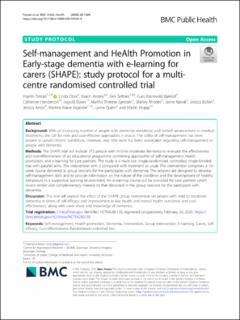Self-management and HeAlth Promotion in Early-stage dementia with e-learning for carers (SHAPE): study protocol for a multi-centre randomised controlled trial
Testad, Ingelin; Clare, Linda; Anstey, Kaarin; Selbæk, Geir; Björklöf, Guro Hanevold; Henderson, Catherine; Dalen, Ingvild; Gjestsen, Martha Therese; Rhodes, Shelley; Røsvik, Janne-Kathrin; Bollen, Jessica; Amos, Jessica; Kajander, Martine; Quinn, Lynne; Knapp, Martin
Journal article, Peer reviewed
Published version

Åpne
Permanent lenke
https://hdl.handle.net/11250/2727164Utgivelsesdato
2020Metadata
Vis full innførselSamlinger
- Department of Clinical Medicine [2066]
- Registrations from Cristin [9791]
Originalversjon
10.1186/s12889-020-09590-9Sammendrag
Background:
With an increasing number of people with dementia worldwide and limited advancement in medical treatments, the call for new and cost-effective approaches is crucial. The utility of self-management has been proven in certain chronic conditions. However, very little work has been undertaken regarding self-management in people with dementia.
Methods:
The SHAPE trial will include 372 people with mild to moderate dementia to evaluate the effectiveness and cost-effectiveness of an educational programme combining approaches of self-management, health promotion, and e-learning for care partners. The study is a multi-site, single-randomised, controlled, single-blinded trial with parallel arms. The intervention arm is compared with treatment as usual. The intervention comprises a 10-week course delivered as group sessions for the participants with dementia. The sessions are designed to develop self-management skills and to provide information on the nature of the condition and the development of healthy behaviours in a supportive learning environment. An e-learning course will be provided for care partners which covers similar and complementary material to that discussed in the group sessions for the participant with dementia.
Discussion:
This trial will explore the effect of the SHAPE group intervention on people with mild to moderate dementia in terms of self-efficacy and improvement in key health and mental health outcomes and cost-effectiveness, along with carer stress and knowledge of dementia.
